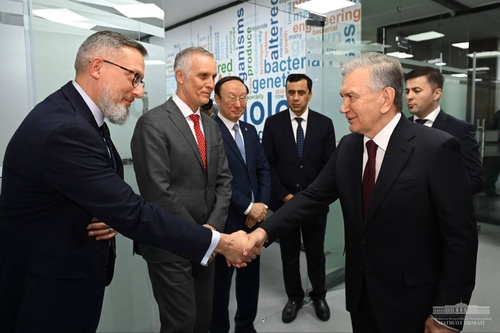The pharmaceutical cluster brings together management, science, education, and manufacturing into a cohesive system.
On December 18, President Shavkat Mirziyoyev visited the innovative scientific and production pharmaceutical cluster "Tashkent Pharma Park".
This complex was established in accordance with the decree of the head of state dated January 28, 2020, with the first stone laid on April 17 of the same year.
In the first phase, a technopark is being constructed on an area of about 20 hectares, which includes an administrative center, a research and development (R&D) center, a laboratory for safety control of pharmaceutical products, a clinical research center, a Pharmaceutical Technical University, and an animal facility.
As of today, the construction of the administrative center has been completed. The 11-story building houses the Agency for the Development of the Pharmaceutical Industry, a conference hall, a coworking center, a business incubator, a museum of industry history, and a library.
The President familiarized himself with the agency and the progress of construction of the other buildings.
The main goals of the cluster are to develop the country's pharmaceutical industry through the introduction of advanced technologies, integration into the international innovation system, production of high-quality medicines, medical devices, and equipment, as well as training qualified specialists. To achieve these ambitious objectives, a land plot of 190 hectares has been allocated in the Zangiata district of Tashkent region.
In the industrial zone, 21 projects with a total value of $818 million are being implemented. The first of these is the "Grand Pharm Logistics Hub" distribution center, which has a cost of $40 million and has created 300 jobs. Enterprises are being established in partnership with companies from Turkey, India, China, Malaysia, the United Arab Emirates, and Russia.
The President spoke with the project initiators. It was emphasized that attracting and supporting investments will be consistently continued.
In the future, 20 more projects worth $620 million are planned to be implemented in the industrial zone.
Overall, the cluster will produce high-quality medicines and medical devices, localized products, creating 8,000 jobs in the process. A Good Practice Center (GxP) will ensure quality and compliance of products at all stages from production to delivery to the consumer.
The head of state was also provided with information about the Pharmaceutical Technical University, which will be part of the cluster.
The university will establish a pharmacopoeia center, a library, a sports complex, and housing for teachers and foreign specialists. It will train highly qualified specialists in the fields of industrial pharmacy, biomedicine, biochemistry, biotechnology, biopharmaceutics, and pharmaceutical chemistry. For this purpose, training will be organized based on international programs, and laboratories in microbiology, biotechnology, cell biology, pharmacology, and analytical chemistry will be created.
The university has already accepted its first students this academic year. The President spoke with them.
– We are attracting investors from developed countries. How do they assess Uzbekistan? Through communication with you. The main wealth of our country is its youth! It is better to utilize advanced programs in pharmacy and train our specialists than to pay foreign specialists and depend on them. That is why we are creating a new university and implementing dual education. Here you will gain not only theoretical knowledge but also practical experience, – emphasized Shavkat Mirziyoyev.
Graduates of the university will receive internationally recognized diplomas from Yonsei University (South Korea), Sunderland, and De Montfort (United Kingdom). Additionally, scientific cooperation has been established with universities in Dundee, Busan, and Purdue.
